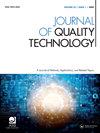Nonparametric monitoring of sunspot number observations
IF 2.6
2区 工程技术
Q2 ENGINEERING, INDUSTRIAL
引用次数: 1
Abstract
Abstract Solar activity is an important driver of long-term climate trends and must be accounted for in climate models. Unfortunately, direct measurements of this quantity over long periods do not exist. The only observation related to solar activity whose records reach back to the seventeenth century are sunspots. Surprisingly, determining the number of sunspots consistently over time has remained until today a challenging statistical problem. It arises from the need of consolidating data from multiple observing stations around the world in a context of low signal-to-noise ratios, non-stationarity, missing data, nonstandard distributions and errors of different kind. The data from some stations experience therefore severe and various deviations over time. In this paper, we apply a systematic statistical approach for monitoring these complex and important series. It consists of three steps essential for successful treatment of the data: smoothing on multiple time-scales, monitoring using block bootstrap calibrated CUSUM charts and classifying of out-of-control situations by support vector techniques. This approach allows us to detect a wide range of anomalies (such as sudden jumps or more progressive drifts), unseen in previous analyses. It helps us to identify the causes of major deviations, which are often observer or equipment related. Their detection and identification will contribute to improve future observations. Their elimination or correction in past data will lead to a more precise reconstruction of the world reference index for solar activity: the International Sunspot Number.太阳黑子数观测的非参数监测
太阳活动是长期气候趋势的重要驱动因素,必须在气候模式中加以考虑。不幸的是,长期对这一数量的直接测量是不存在的。唯一与太阳活动有关的观测记录可以追溯到17世纪,那就是太阳黑子。令人惊讶的是,直到今天,持续确定太阳黑子的数量仍然是一个具有挑战性的统计问题。它源于在低信噪比、非平稳性、数据缺失、非标准分布和不同类型误差的背景下,需要整合来自世界各地多个观测站的数据。因此,一些台站的数据随着时间的推移出现了严重和各种各样的偏差。在本文中,我们应用系统的统计方法来监测这些复杂而重要的序列。它包括成功处理数据所必需的三个步骤:在多个时间尺度上平滑,使用块引导校准的CUSUM图进行监测,以及通过支持向量技术对失控情况进行分类。这种方法允许我们检测大范围的异常(如突然跳跃或更渐进的漂移),在以前的分析中看不到。它帮助我们确定主要偏差的原因,这些偏差通常与观察者或设备有关。它们的探测和识别将有助于改进今后的观测。它们在过去数据中的消除或修正将导致更精确地重建世界太阳活动参考指数:国际太阳黑子数。
本文章由计算机程序翻译,如有差异,请以英文原文为准。
求助全文
约1分钟内获得全文
求助全文
来源期刊

Journal of Quality Technology
管理科学-工程:工业
CiteScore
5.20
自引率
4.00%
发文量
23
审稿时长
>12 weeks
期刊介绍:
The objective of Journal of Quality Technology is to contribute to the technical advancement of the field of quality technology by publishing papers that emphasize the practical applicability of new techniques, instructive examples of the operation of existing techniques and results of historical researches. Expository, review, and tutorial papers are also acceptable if they are written in a style suitable for practicing engineers.
Sample our Mathematics & Statistics journals, sign in here to start your FREE access for 14 days
 求助内容:
求助内容: 应助结果提醒方式:
应助结果提醒方式:


